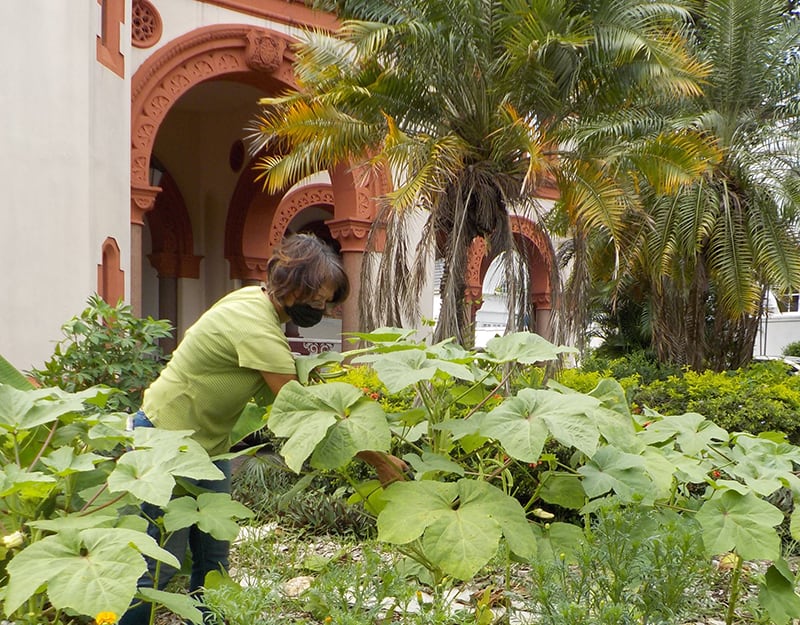
PORT OF SPAIN, Trinidad (CNS) — Archbishop Jason Gordon of Port of Spain has been calling on people to grow more food in recent months.
His encouragement has been particularly urgent following widespread job losses in Trinidad beginning with a state-ordered lockdown in March in response to rising numbers of COVID-19 cases.
Thousands of new clients have flocked to Catholic food distribution centers for months, signaling the scale of the pandemic’s economic impact. For them, growing their own food is a viable option.
For families not so severely affected, the idea of planting food seemed to be a suitable remedy to cabin fever.
“My husband was home,” said Francine Johnson, a Society of St Vincent de Paul volunteer in Maraval, an urbanized valley in the forested foothills northwest of Port of Spain. “We were having problems with our yard and decided, instead of planting a pretty garden, we (would) plant food. It was interesting that many other people (also) started talking about food.”
Food security has been on Archbishop Gordon’s mind for some time. In March 2019, the archdiocese partnered with a community organization committed to mitigating hunger by planting 300 breadfruit trees throughout the country. At the project’s launch, Archbishop Gordon noted, “We are planting less and less, importing more and more, which means, any little imbalance in the world and we are going to be caught out on the wrong side of food security.”
Then the pandemic hit, highlighting the island nation’s unsustainable and costly level of food imports. In 2019, the country located off the north coast of Venezuela spent the equivalent of $160 million on imported cereals, fruit and vegetables.
In turn, the government in October began urging a return to growing food locally.
A proposal that once might have been resisted in a society accustomed to decades of oil wealth because agriculture has long carried the haunting stigma of long-ago plantations and subjugation turned out to be not such a bad idea as the pandemic continued.
On the feast of Corpus Christi in June, the archdiocese distributed seeds to anyone who wanted to plant food. The day is traditionally associated with planting in Trinidad.
The church also engaged the services of Charlene Woo Ling, an advocate of syntropic agroforestry, the practice of growing of fruit and nut trees, vegetables and timber in the way nature works to replenish the soil. She has since transformed every square inch of manicured lawn at Archbishop’s House, Archbishop Gordon’s residence, and chancery offices into a forest-inspired food garden.
Archbishop’s House, one of a line mansions known as The Magnificent Seven that faces one side of the Queens’s Park Savannah, is 15 minutes from the center of Port of Spain. Woo Ling also was allowed to plant food crops along the natural area’s perimeter fence.
Homeless people who regularly sleep at night in the 260-acre savannah or at another nearby park have been allowed to pick the produce to eat. “The idea is to share,” Woo Ling said.
Tonia Gooding, a mother of six, revived gardening in June at her Santa Cruz home in another semi-forested valley five miles northeast of Port of Spain. She has shared her excess limes, mangoes, peppers and okra with visitors, family and friends.
Two of her children, including the youngest at 6 years old, were interested in the garden. Such bonding opportunities are among the experiences Gooding has treasured despite the challenges of the pandemic.
“You really felt God’s presence, especially when you saw the first blossom,” she said. “Everyone should have a little garden in Trinidad. I really believe soon we can actually go back to bartering.”
Already, about 100 families exchange seeds, sweet potato slips, produce and gardening advice.
Both the garden at Archbishop’s House and a smaller one at a diocesan office compound in central Trinidad are demonstration sites for training anyone interested in growing food.
“We’re really trying to target young families so children could get accustomed to growing things, not just academics,” said Woo Ling, a former IT engineer and hospitality management professional.
But she also wants to train poor people, particularly those who are homeless, to grow their own food.
“It’s not just about giving, it’s about helping them also … give back by learning how to grow. Yes, we want to help poor people, but also get poor people to come out of that sense of dependency which, to me, is greater.”
The work is labor intensive, Woo Ling admitted, but necessary.
“Unless a society, a nation can feed itself, it’s heading down the wrong road,” she said. “It’s heading down to decline, it’s heading down to dependency, it’s heading down to loans, it’s heading down to being in the clutches of other persons and doing what they want, rather than doing what is right.”









